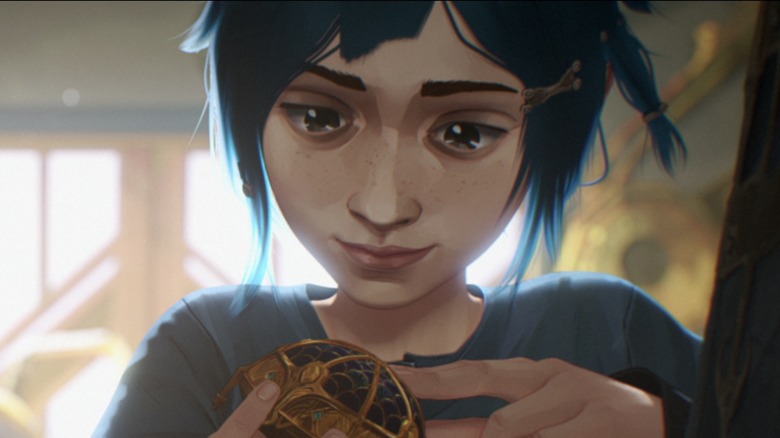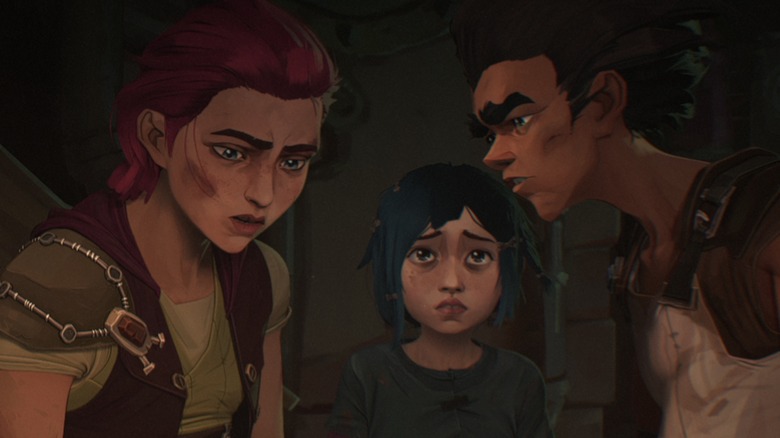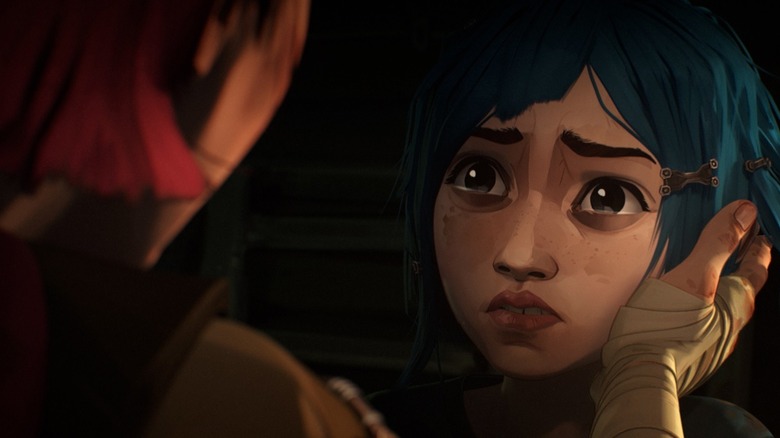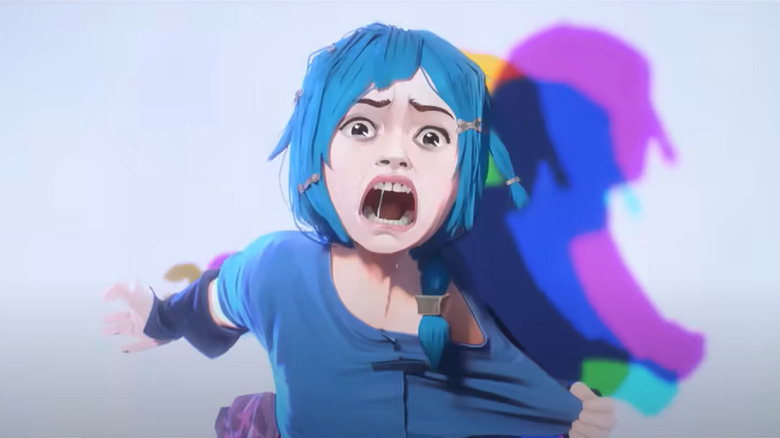Arcane Fans Have A Rather Dark Theory About Powder's History With Vi
It is an undeniable fact that "Arcane," the TV series based on Riot Games' "League of Legends," was received by longtime League players, critics, and newcomers alike, with no shortage of praise — just take a look at the animated series' IMDB or Rotten Tomatoes pages. On top of that, the Netflix series also made Emmy history in 2022.
Among the many stellar aspects of the series that make it worth watching, like the hybrid animation style and the immersive sound design, the characters, how fleshed out and nuanced they are, and their relationship with one another, is one of the strongest points in "Arcane." One of the main relationships in the series, if not the center one, is the relationship between sisters Vi (Hailee Steinfeld) and Powder (Mia Sinclair Jenness), the latter sister becoming Jinx (Ella Purnell) after the tragic end to Episode 3, appropriately titled "The Base Violence Necessary for Change."
Powder's mental health problems, which lead to her spiraling into Jinx, are one of the most debated and discussed aspects of the show. It appears that some fans on Reddit have strong opinions about what could've contributed to how Powder ended up with a few screws loose and shadows of past trauma coming back to often haunt her.
Theories on the true nature of Vi and Powder's relationship
For Reddit user u/daynf, the music video for Imagine Dragons' "Enemy" holds some relevant nuggets of information that made them look at Powder and Vi's relationship in a different light. At the time, it was difficult for this Redditor to understand why Powder would break down hysterically after Vi leaves her alone to go rescue Vander (JB Blanc) in Episode 3, but after watching "Enemy" they wrote: "the part where Vi's upset and knocks Powder down it made something click. Powder looks like she's legitimately afraid of Vi and that makes me think that maybe Vi was physically abusive to Powder. It would make her breakdown make more sense. She wants Vi's approval, but she has a panic response whenever she thinks she's let her sister down because in the past it meant that she would be physically hurt."
However, this would go against Vi's complex characterization in "Arcane." In the final scene of Episode 3, wherein Vi hits Powder when fueled by her grief and outrage, it is clear by her reaction that she is not used to striking her little sister like that. Although it would be fair to say that they would argue as sisters do, and as the music video shows, calling the eldest sister "physically abusive" seems to be a slight misrepresentation that unfairly focuses the blame on Vi for Powder's psychological problems. "NO, Damn!" wrote another Redditor as a response. "I don't get why after seeing how much Vi loves, cares and protects her sister even at her own expense there, people are still ready to try to blame her for being an "abusive sister"."
Some fans have other explanations
It's fair, first and foremost, to blame the contentious social environment for Powder's trauma. Living in Zaun, as opposed to Piltover, made it so the sisters had to deal with all the injustices and inequalities of living in the underground. Because of the rivalry between the prosperous topside and the precariousness of the Lanes, the sisters' parents were prompted to follow Vander and fight on the bridge, of which we only see the harrowing aftermath as the introductory scene to the whole show. On that day, Powder lost her entire family except for Vi, which not only makes for a very traumatizing event but it also made the youngest of the two emotionally dependent on the eldest.
In response to the Reddit thread, u/TheWheatleyWhisperer wrote: "We see at the start of Arcane when Powder is hesitating to jump, Vi says 'Powder, look at me. What did I tell you?' To which she responds 'That ... I'm ready.' So before this, Vi gave Powder the validation she needed to believe in herself. But then when it's time to go save Vander, Vi tells Powder 'You're not ready.' Seemingly invalidating every encouraging thing Vi told her before that. She feels like her sister doesn't believe in her. She feels like she sees her as weak and incapable and it weighs down pretty heavy on her that the person she admires the most doesn't believe in her."
Having her previous words of validation withdrawn like that makes for a very heavy blow for a young and emotionally fragile Powder.
Powder's emotional crutch
Another Redditor, u/joshhamilton235, appropriately described Vi as Powder's "emotional crutch," saying: "She was told by Vi that she was finally ready and able to do a job like she's one of the gang. When Vi told her to sit out because of her recent screw up and that she was now not ready, it was as if her guardian was abandoning her just like the rest of the gang wanted her to stay behind whenever it came to doing an important job. And thus due to her abandonment issues, she suffers a mental breakdown due to her belief that her guardian and emotional crutch had now left her behind just like Mylo and Claggor wanted. Her breakdown is a result of what happens when a kid with abandonment issues feels as if they have in fact been abandoned." Indeed, abandonment issues can manifest themselves in the exact way that Powder reacts when left behind.
For most people, having their sister leave them behind wouldn't result in them having a mental breakdown, but for Powder, it was inevitable as well as understandable. She grew up in a breeding ground for trauma, tragically lost her family, and her only remaining blood relative is, in her view, "abandoning" her because she deems her not strong enough. The reality is that there didn't need to be any abuse on Vi's part for Powder to end up the way she did — if anything, the blame thematically lies in the inequality and instability experienced in the underground. And as a result, at the end of "Arcane" Piltover must deal with the fallout of having exploited Zaun without ever helping its destitute people.



